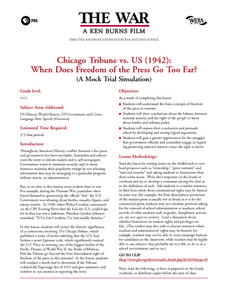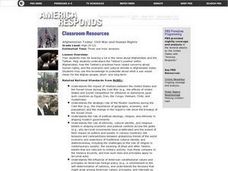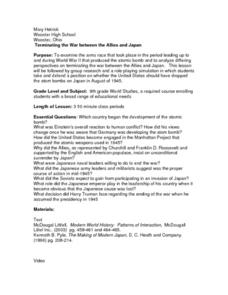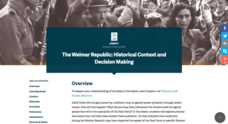Curated OER
The Berlin Airlift
Students examine a document from the Berlin Airlift in order to research his important event in World History.
Curated OER
Chicago Tribune vs. US (1942): When Does Freedom of the Press Go Too Far?
Young scholars define freedom of the press in peace and war time. As a class, they identify the need for the public to be informed, but discuss where the line should be drawn to protect national security. They develop their arguments...
Curated OER
On The Home Front
Young scholars write their responses to five questions about their home town. After watching an excerpt from "The War", they work together in groups to identify the characteristics of the four towns in the movie into a graphic...
Curated OER
Non-Violence Means "Doing Nothing"
Students reflect on violence and non-violence. In this World History lesson, students read an article by Gandhi then write an essay as to whether they agree or disagree with his thoughts. Students then share all their ideas as a class.
National WWII Museum
“My Dear Little Boys…” Interpreting a letter home from the war
Letters have long been prized by historians as primary sources for what they reveal not only about events but also about the emotional responses of the writers to these events. "My Dear Little Boys," a letter written by Leonard Isacks on...
National Endowment for the Humanities
James Madison: Raising an Army—Balancing the States and the Federal Government
To war! To war! Every nation in the history of the world has had to deal with warfare on some level. Scholars go through a series of activities and discussions surrounding the development of the Constitution to help them better...
Stanford University
Korean War
Learners study the cause of the Korean War. In this World history lesson, Students read excerpts from two different textbooks, one from South Korea, and one from North Korea. They discuss how the cause of the war differs depending on the...
National Endowment for the Humanities
Sources of Discord, 1945-1946
From Allies to enemies within a year. Scholars research the falling out between the United States and the Soviet Union from 1945-1946 in the first lesson of a three-part series. Using primary source materials, group work, and interactive...
Carolina K-12
Introduction to the Holocaust
Young historians gain a well-rounded insight into the tragedy of the Holocaust by exploring pre-war Jewish life, reading and discussing survivor testimonies, and illustrating their understanding by using their own words and those of a...
Curated OER
America's Wars, 1898-1945
Students examine the wars the United States was involved in between 1898 and 1945. In groups, they determine the causes and effects of each war and how each war changed the way the United States handled their foreign affairs. As a class,...
Curated OER
Afghanistan Today: Civil War and Human Rights
Students examine the relationship between the United States and the Soviet Union during the Cold War. They analyze the role of religion and cultural identity in shaping governments. They also examine the United States foreign policy.
Curated OER
World Religions
Ninth graders investigate the symbols and historical figures of the five main religions of the world. They participate in a class discussion, listen to a lecture and take notes, and write five Haikus, one about each major religion of...
Stanford University
Cold War in Guatemala
Students investigate the Cold War and why it was fought in Guatemala. In this Cold War lesson, students analyze documents from the CIA and textbooks then discuss. Students work in pairs to answer questions and fill out graphic organizers.
Curated OER
Building Suburbia: Highways and Housing in Postwar America
Students determine how suburbs changed America. In this post World War II lesson, students complete research projects that require them to examine the growth of suburbs in the 1950's and 1960's. Students reveal how government policies,...
Lesson Snips
Lessons from the Holocaust
Connect global examples of attempted genocide with a well-designed social studies lesson. It includes an excellent informational text with background information on the Holocaust, as well as worksheets, book report guidelines, and...
Constitutional Rights Foundation
History of Immigration From the 1850s to the Present
The Statue of Liberty may embrace the huddled masses of the world, but has American society always joined in? After young historians read a passage about the history of American immigration in the 19th and 20th centuries, focusing on...
Curated OER
"The Gambler" and "The Journey": A Comparison of Worlds in Two Short Stories
“The Gambler” and “The Journey” offer readers an opportunity to experience two very different views of Jewish life in Poland between WWI and WWII. Whether used as a part of a study of the Holocaust, or as a compare/contrast exercise, the...
US House of Representatives
Exclusion and Empire, 1898–1941
Often forgotten and written off as the model minority, Americans with heritage in Asia and the Pacific Islands have played an essential role in American history, including Congress. Budding historians reclaim history by researching the...
The New York Times
Kiev in Chaos: Teaching About the Crisis in Ukraine
Provide a historical context for the political unrest between Russia and Ukraine that began in late 2013. Learners review their prior knowledge and chronicle new understandings with a KWL chart, watch a video explaining the Ukrainian...
Curated OER
Man's Search For Meaning: Concept Analysis
Designed as a resource for teachers who use Man's Search for Meaning, this seven-page packet includes a list of related informational texts, research issues and project ideas, central questions, background information on World War II and...
Curated OER
Terminating the War between the Allies and Japan
Ninth graders examine the arms race that took place in the period leading up to and during World War II that produced the atomic bomb. They analyze differing perspectives on terminating the war between the Allies and Japan. They ...
National Endowment for the Humanities
The House Un-American Activities Committee
Was the House Un-American Activities Committee justified in investigating subversive influences in the entertainment industry? Part two of the three-part series of lessons that examine the anti-communism movement after World War II,...
Curated OER
Communities in Crisis Lesson 1: Primary Source? What is That?
Distinguish between primary and secondary source documents using the theme of philanthropy. Middle schoolers discuss Anne Frank: The Diary of Young Girl as a way to study the past using a primary source. Then they investigate how to...
Facing History and Ourselves
Us and Them: Confronting Labels and Lies
Stereotyping and discrimination based on religion catalyze many atrocities in the world. Explain the awful treatment of Jews and the lies Nazis spread by using an informative yet sensitive resource. Learners participate in a warm-up and...

























